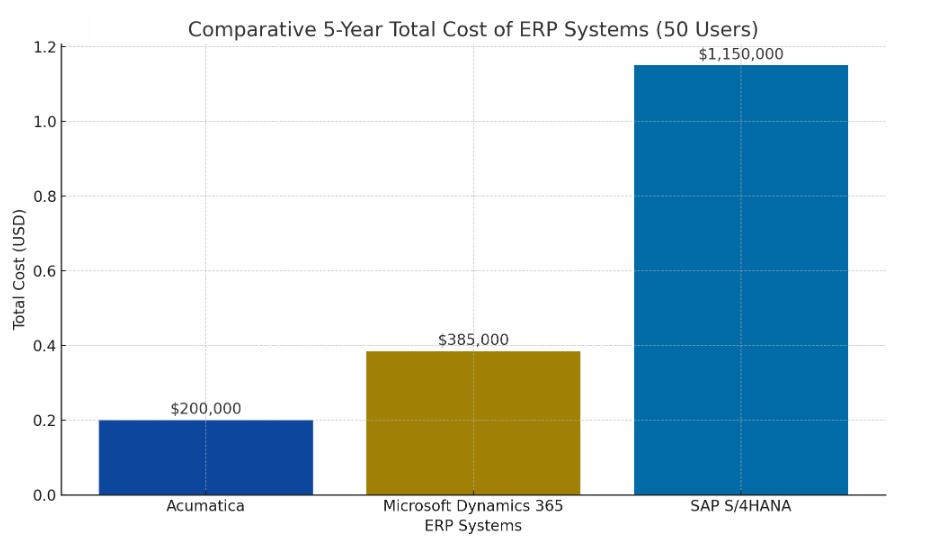Choosing the right ERP system can feel overwhelming, especially with so many options on the market. Many vendors promise flexibility, scalability, and value, but often fall short when you dive deeper. Acumatica stands out with its unique approach, but how does it really compare to other cloud ERP solutions?
When comparing Acumatica Cloud ERP with competitors, businesses often ask: Does Acumatica provide better long-term value? Is its unlimited user pricing truly beneficial? Will it scale alongside business growth?
In 2025, more businesses are moving away from traditional ERP systems in favor of flexible, cloud-based solutions that support remote work, adapt quickly to change, and offer cost-effective pricing models. This blog inspects how Acumatica measures up to those expectations.
Comparing Acumatica Cloud ERP with Competitors: What Sets It Apart?
Acumatica Cloud ERP stands out in many ways that matter to businesses. Let’s look at these key features.
Customization and Flexibility
Acumatica allows you to adjust workflows to match your specific needs. Its user-friendly interface and modules that can easily change with your demands compliments this customization. Its open architecture enables smooth integration with other business tools, enhancing its flexibility and efficiency.
Real-time Data Access and Insights
With Acumatica, you get top-notch reporting and analytics. You can access data in real-time, wherever you are, because it’s cloud-based. This feature helps decide based on facts, not just guesses, paving the way for more informed strategies.
Cost-effective Licensing Model
Acumatica’s pricing is uniquely simple. It offers unlimited user pricing, making it more affordable than others. That way your business can grow without your ERP software licensing cost ballooning out of control.
For many professionals comparing Acumatica Cloud ERP with competitors, questions like “What is the advantage of Acumatica?” or “Why Acumatica is better than NetSuite?” often come up. Acumatica’s edge lies in its ability to provide a flexible, cost-effective, and user-friendly ERP system that elevates productivity and decision-making.
Hear one business leader talk about his company’s experience when replacing NetSuite with Acumatica.
Comparing Acumatica Cloud ERP with Competitors: Key Advantages
Superior Customer Support and Resources
Acumatica offers a wide range of online resources for users. Forums provide a platform for shared knowledge, helping users solve issues quickly. Customer service is another strength, promptly resolving inquiries. Plus, Acumatica Open University’s free and comprehensive training programs make adopting Acumatica straightforward. With it, new users can quickly get up to speed with system functionality.
Scalability for Growing Businesses
When comparing Acumatica Cloud ERP with competitors, Acumatica impresses with its scalability. It adapts well as businesses grow, maintaining performance regardless of size. Acumatica’s cloud-based setup is key. This allows seamless scaling as business operations expand, without sacrificing system efficiency. Acumatica is cost-effective; it charges based on functions, not users.
For a business preparing for future growth, Acumatica offers peace of mind with its reliable performance. This is especially clear when compared to others that may struggle with increasing workloads.
Consider the results Polywood achieved:
- Gained a real-time, flexible ERP platform, streamlining operations and eliminating batch-processing
- Acquired a reliable platform that scales effortlessly as transactions soar
- Connected custom-made manufacturing execution system via flexible platform with open API
- Closed books faster by three days while gaining real-time data visibility
- Eliminated challenges that required office staff to help warehouse staff ship product
- Improved employee productivity with automated processes while eliminating printing of Excel files
- Streamlined online order processing
- Improved shipping times increasing customer satisfaction
- United siloed applications, creating a single source of data and visibility across the company
“Acumatica has enabled us to actually work on the business again. We have a solid platform where we’ve been able to start making life easier for the business.”
Sean Valencourt, EVP of Information Systems
POLYWOOD
Among its competitors, Acumatica stands out, offering superior customer support and unmatched scalability. Its combination of resources and adaptability set it apart, making it the best choice for businesses planning to grow. Would you like to learn more about how Acumatica compares to others like NetSuite? Check out this comparison.
ERP Competitors Comparison: Weighing the Options
Choosing an ERP isn’t simple. It requires evaluating features and comparing costs. Let’s break down the main areas before you decide.
Functionality and Industry Fit
When comparing ERPs, functionality is key. Each ERP shows strengths in different areas. For instance, while Acumatica provides customizable workflows suited for various industries, other solutions, like Microsoft Dynamics 365 might offer better AI-powered features and wider use cases. Consider the ease of use versus complexity. If your team requires streamlined operations, Acumatica excels in user-friendly implementations. Evaluate the unique selling points to see which fits your industry needs best.
| Feature | Acumatica | Microsoft Dynamics 365 | SAP S/4HANA |
|---|---|---|---|
| AI Integrations | Basic | Advanced | Minimal |
| Customizable Workflows | Extensive | Moderate | Limited |
| Suitability for Industries | Broad | Finance, Retail | Heavy Industries |
Comparing Acumatica Cloud ERP with Competitors: Pricing and Value for Money
Next, let’s talk about pricing. Licensing structures differ significantly among ERPs. Most importantly, Acumatica’s licensing considers functional modules rather than individual users, potentially offering better long-term value. The price for ERP options varies, like SAP S/4HANA, which tends to be costlier because of its comprehensive capabilities.
| Cost Aspect | Acumatica | Microsoft Dynamics 365 | SAP S/4HANA |
|---|---|---|---|
| Licensing | Consumption-based, unlimited user access | Per-user licensing, varies by modules | Tiered model, based on modules |
| Implementation Fees | $50,000 to several million depending on scope | Starts around $100,000 | Begins at $250,000, can increase |
| Subscription Fees | Based on number of applications implemented | Starts at ~$75/user/month, varies | Begins at ~$50,000/year |
Acumatica aligns well for cost-conscious users looking for functionality over quantity.
Consider this 5-year cost comparison.

*The numbers shown here are based on average implementation and licensing cost estimates for organizations with approximately 50 users. Actual costs will vary, depending on license types, functionality, implementation complexity, etc.
Comparing Acumatica Cloud ERP with Competitors: User Support and Community Engagement
Support options can vary broadly. Acumatica provides a rich assortment of online resources, training sessions, and knowledgeable customer service teams. This beats out competitors like Microsoft Dynamics and SAP, who may have limited user groups and forums.
| Support Type | Acumatica | Microsoft Dynamics 365 | SAP S/4HANA |
|---|---|---|---|
| Online Resources | Extensive | Moderate | Basic |
| Training Programs | Comprehensive | Standard | Basic |
| Community Forums | Active | Limited | Limited |
For businesses seeking responsive and accessible support, Acumatica is a sound choice.
In conclusion, when comparing Acumatica Cloud ERP with competitors, Acumatica stands out for its flexible pricing, extensive functionality, and high-quality support. While Microsoft Dynamics offers advanced features, Acumatica’s value for cost and user-centric design makes it a winner.
Evaluating Acumatica’s Market Share and Growth
Acumatica has shown impressive growth. In 2022, it reported a year-over-year growth of 30% in its customer base, mainly from small and medium businesses. This trend reflects its increasing adoption in industries like manufacturing and field service. Acumatica’s strategic goals include leveraging international expansion, although results have been mixed so far.
| Market Metric | 2022 Status | Growth Trajectory |
|---|---|---|
| Customer Base Growth | 30% annual growth | Focus on SMB industries |
| Gross Margin | Over 70% | Consistent performance |
| Industry Adoption | Widespread in SMBs | Continues to expand |
Acumatica is capitalizing on its ability to serve businesses with basic operational needs, aiming for steady expansion and innovation.
Making the Final Decision
Choosing between Acumatica and its alternatives requires careful evaluation. Here are some essential questions to consider:
- What specific business processes need improvement?
- Are future scalability and customization important for your organization?
- How do stakeholders view integration with current systems?
Align business needs with the ERP’s capabilities to make the most informed choice. By involving key stakeholders, companies can ensure they select an ERP that aligns with their operational goals.
Comparing Acumatica Cloud ERP: A Clear Winner for Mid-Sized Companies
A recent Gartner report recognized Acumatica for its tailored approach to serving small and mid-sized businesses (SMBs), emphasizing the platform’s ability to meet the changing needs of growing companies. Acumatica stood out for several key capabilities that help SMBs streamline operations and drive growth:
- Customizable Workflows: Acumatica offers flexible workflow automation tools, allowing businesses to tailor processes to match their specific operations without complex coding.
- Scalable Cloud Platform: Designed for growth, Acumatica’s cloud-native architecture makes it easy for SMBs to expand without costly infrastructure upgrades.
- Industry-Specific Solutions: Acumatica provides specialized editions for industries like manufacturing, distribution, retail, and construction, delivering tools tailored to each sector’s unique challenges.
- Consumption-Based Pricing: With a pricing model based on computing resources rather than per-user fees, SMBs can scale their teams without increasing licensing costs.
- User-Friendly Interface: Acumatica’s modern interface simplifies data access and reporting, making it easier for teams to adopt and maximize the software’s potential.
- This recognition reinforces Acumatica’s position as a top choice for SMBs seeking an adaptable, growth-friendly ERP solution.
Conclusion: Is Acumatica Cloud ERP Right for Your Business?
Throughout this comparison, we’ve seen how Acumatica Cloud ERP distinguishes itself from competitors through its flexible pricing model, comprehensive functionality, and superior customer support. Its unlimited user pricing, robust customization options, and proven scalability make it particularly attractive for growing businesses.
Important points we’ve discovered while comparing Acumatica Cloud ERP with competitors:
- A consumption-based pricing model that allows unlimited users without increasing costs
- Extensive customization capabilities that adapt to your specific business needs
- Superior customer support and training resources through Acumatica Open University
- Strong track record of helping businesses like Polywood achieve significant operational improvements
- Consistent market growth and recognition from industry analysts like Gartner
Ready to see how Acumatica Cloud ERP can transform your business operations? Take the next step by scheduling a personalized demo. Our team will show you exactly how Acumatica can address your specific business challenges and help drive growth.



